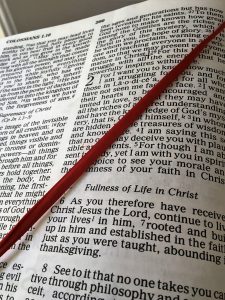 The law of the Lord is perfect, refreshing the soul. The statutes of the Lord are trustworthy, making wise the simple. The precepts of the Lord are right, giving joy to the heart. The commands of the Lord are radiant, giving light to the eyes. The fear of the Lord is pure, enduring forever. The decrees of the Lord are firm, and all of them are righteous. They are more precious than gold, than much pure gold; they are sweeter than honey, than honey from the honeycomb. By them your servant is warned; in keeping them there is great reward (Psalm 19:7-11 NIV).
The law of the Lord is perfect, refreshing the soul. The statutes of the Lord are trustworthy, making wise the simple. The precepts of the Lord are right, giving joy to the heart. The commands of the Lord are radiant, giving light to the eyes. The fear of the Lord is pure, enduring forever. The decrees of the Lord are firm, and all of them are righteous. They are more precious than gold, than much pure gold; they are sweeter than honey, than honey from the honeycomb. By them your servant is warned; in keeping them there is great reward (Psalm 19:7-11 NIV).
The creation bears witness to the glory of the I AM, but if we are to know the Sovereign Lord of whom creation testifies, if we are to know how we may be right with him and do his will, we need more. For this reason, David turns from general revelation to special revelation. He takes us to the Holy Scriptures, which he calls by a number of names: law, statutes, precepts, commands, fear, and ordinances. All of which combine to say that God the Creator is also God the Communicator. He has spoken to mankind through his written word.
In the first two stanzas about creation, the I AM was called “God,” Elohim, once. In the third stanza about the Scriptures, he is called “LORD,” YHWH, six times. For now he speaks as covenant Lord—the One who approaches mankind “person to person,” who graciously calls rebellious people to himself.
Verses 7-9 follow a pattern. First, there is a descriptive name for the Scriptures; second, the possessive phrase “of the LORD is used;” third, there is an appropriate predicate adjective; and fourth, David speaks of a beneficial effect or other praise of the Scriptures.
Let us start by considering the descriptive names for the Holy Scriptures that David uses.
- “law” — This word is about used 221 times in the Old Testament Scriptures. Its basic meaning is teaching. When we hear the word “law,” our minds move in the legal-political sphere, but this word means law in the sense of authoritative instruction from God. “In addition, the book of Deut itself shows that the law has a broad meaning to encompass history, regulations and their interpretation, and exhortations.” [Theological Wordbook of the Old Testament, TWOT] Due to various theological presuppositions, various writers become confused when they read this verse, thinking of either “the moral law,” or “the ten commandments,” etc. Neither does it mean the law covenant given at Sinai. Here “law” refers to the Scriptures, the inspired, written revelation of God.
- “statutes” — This word is perhaps better translated as “testimony.” It is used many times in this sense; for example, in referring to the Ark of the Covenant, the Tabernacle, or the Tablets of Stone. Exodus 24:12; 31:18; 32:15; 34:29. “This word is always used in reference to the testimony of God.” [TWOT] It is as God, rather than claiming “executive privilege,” allows himself to be examined on the witness stand. But in this case, it is God himself taking the initiative to make known testimony about himself, his will, and his redemptive activity. God testifies about himself, and about what man should do or has failed to do. For example, read 1 Corinthians 10:1-13.
- “precepts” — This “is a general term for the responsibilities that God places on his people.” [TWOT] God orders us to do various things and forbids us to do others. It is his voice of authority to us about how to use our lives.
- “commands” — This has the idea of “the instruction of a teacher to his pupil” [TWOT], Proverbs 2:1; 3:1. It is used of the Ten Words. Exodus 24:12.
- “fear” — This is an unusual way of referring to God’s word. David uses a word to describe the Holy Writings that speaks of the effect they are intended to create in the hearts of those who listen to them. This is the “awe or reverence for God that is the basis for real wisdom.” [TWOT] Job 28:28; Proverbs 9:10; 15:33. The Scriptures may not be treated as abstract principles, but as God’s message that is intended to transform our thinking, feeling and decision-making.
- “ordinances” — “Represents what is doubtless the most important idea for correct understanding of government—whether of man or by man or of the whole creation of God … an ordinance of law.” [TWOT] These are the judicial decisions or verdicts God has given for human situations. Final authority! See Deuteronomy 33:10, 21; it is used 16 times in Psalm 119.
“Together, these terms show the practical purpose of revelation, to bring God’s will to bear on the hearer and evoke intelligent reverence, well-founded trust, detailed obedience.” [Kidner] Read through these verses a few times to receive the cumulative impact of their description of God’s special revelation. Consider what each one means for your world and life view and way of life. How will they transform your view of God’s word?
Grace and peace, David

 Ruth 1:6-9
Ruth 1:6-9